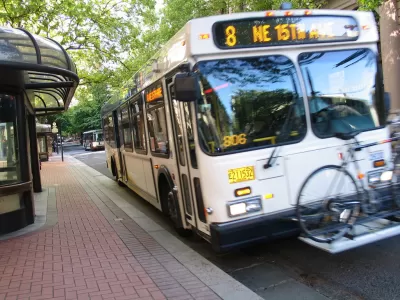Fines will be waived for low-income riders, among other changes aimed at bringing "fairness and equity" to TriMet's enforcement system.

The Board of Directors of TriMet has restructured the way the agency penalizes fare evasion.
Currently, riding without fare is punishable by a $175 fine. Beginning in July, fines for adult riders will be assessed in tiers corresponding to the number of prior offenses, with $175 as the highest. Community service will also become an option in lieu of payment, with required hours determined by a similar tier structure.
Additionally, fare citations will be waived for adult riders eligible for TriMet's low-income fare program (launching concurrently with the new penalty system), or the existing Honored Citizen program for senior and disabled riders.
"The changes are in response to criticism that fare evasion charges disproportionately affect minorities and unnecessarily pushes too many of them into the criminal justice system," Jim Redden of Portland Tribune reports. Similar concerns have prompted changes to fare enforcement strategies in New York, Cleveland, Washington state, and California. In Portland, an internal study found "no systemic racial bias" in TriMet's fare enforcement, but noted that pushing people into the court system over the low-level offense could "affect a person's ability to get a job, rent a house or serve in the military."
FULL STORY: TriMet changes fare evasion penalties

Alabama: Trump Terminates Settlements for Black Communities Harmed By Raw Sewage
Trump deemed the landmark civil rights agreement “illegal DEI and environmental justice policy.”

Study: Maui’s Plan to Convert Vacation Rentals to Long-Term Housing Could Cause Nearly $1 Billion Economic Loss
The plan would reduce visitor accommodation by 25% resulting in 1,900 jobs lost.

Why Should We Subsidize Public Transportation?
Many public transit agencies face financial stress due to rising costs, declining fare revenue, and declining subsidies. Transit advocates must provide a strong business case for increasing public transit funding.

Wind Energy on the Rise Despite Federal Policy Reversal
The Trump administration is revoking federal support for renewable energy, but demand for new projects continues unabated.

Passengers Flock to Caltrain After Electrification
The new electric trains are running faster and more reliably, leading to strong ridership growth on the Bay Area rail system.

Texas Churches Rally Behind ‘Yes in God’s Back Yard’ Legislation
Religious leaders want the state to reduce zoning regulations to streamline leasing church-owned land to housing developers.
Urban Design for Planners 1: Software Tools
This six-course series explores essential urban design concepts using open source software and equips planners with the tools they need to participate fully in the urban design process.
Planning for Universal Design
Learn the tools for implementing Universal Design in planning regulations.
Caltrans
Smith Gee Studio
Institute for Housing and Urban Development Studies (IHS)
City of Grandview
Harvard GSD Executive Education
Toledo-Lucas County Plan Commissions
Salt Lake City
NYU Wagner Graduate School of Public Service




























